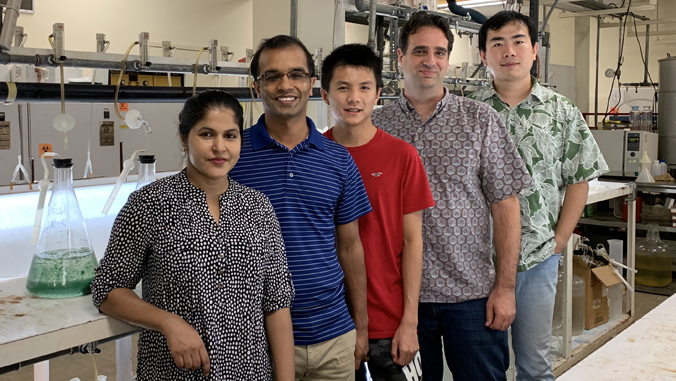
A team of researchers at the University of Hawaiʻi at Mānoa came across a discovery they never intended to uncover when a graduate student attempted to verify calculated data just prior to publication of a study involving cyanobacterial natural products that inhibit cancer cell growth. Instead of confirming results, he and his professors found a glitch in a well-adapted computer program that could have an impact on more than 100 published studies citing the original paper.
The glitch involves a common nuclear magnetic resonance (NMR) computation. Graduate student Yuheng Luo was trying to verify the results of chemistry Professor Philip Williams’ group as part of our on-going collaboration. Luo realized that the results of the computation depended on the operating system of the computer, i.e. Mac OS, Windows and Linux would return different results. He reported the glitch to his advisor, chemistry Assistant Professor Rui Sun.
“We were surprised to see the initial findings, as the results of the computation should solely depend on the chemistry instead of the operating system of the computer,” Sun said. “We began comparing results obtained from different operating systems to find the source of the errors. It turned out that there is a glitch in the code that compromises the results of the calculation on certain operating systems.”
“Studies that used the original code for NMR computations could probably be incorrect,” Luo said. “Because most researchers didn’t include the type of operating system they used, there is no easy way to know if their results were affected by this glitch.”
Sun worked on a solution to the source code. He and Williams reached out to the authors of the original study to alert them. Those researchers encouraged the UH Mānoa professors to publish their findings.
“They were supportive of our work,” Williams said. “While the glitch did not cause a massive deviation, it could have potentially had major effects on studies based on the initial one. If we are trying to find a drug to fight cancer, we may be going down a path that deviates from the accurate data.”
The hundreds of lines of debugged code and the team’s findings were published this month in Organic Letters.
The researchers stressed that this is exactly how the scientific process works.
“Science, done well, is a collaborative self correcting processes from observation to the testing of predictions based on a hypothesis, to the verification of other results by the scientific community,” Williams said.

